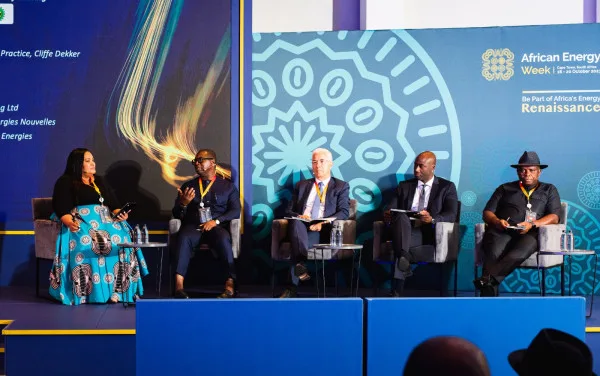
African nations are recognizing the imperative of harnessing and processing their resources domestically. A key focus lies in strengthening procurement, fabrication, and manufacturing capabilities within the continent’s oil and gas industry. During a panel discussion that was held at African Energy Week 2023 – organized by the African Energy Chamber (https://EnergyChamber.org) -, industry leaders converged to discuss the imperative of local content development. The session was sponsored by the NCDMB.
In his keynote address, Simbi Wabote, the Executive Secretary of the Nigerian Content Development and Monitoring Board (NCDMB), stressed the importance of national commitment. “The first step is to make local procurement, fabrication, and manufacturing a national agenda. This should be backed by appropriate legislation, driven by local circumstances and aspirations and ultimately should aim to foster human capacity development, employment, infrastructure, and local manufacturing,” he said.
Highlighting the impact of policy directives, Wabote showcased Nigeria’s progress under the Nigerian Oil and Gas Industry Content Development Act (NOGICD) implemented in 2010. He emphasized the significance of continuous projects, creating opportunities to learn from past mistakes and drive local content strategies.
Citing examples of what has been achieved thus far, he highlighted that NOGICD has set a minimum Nigerian content target in 278 services, which has strengthened local businesses.
“We have grown fabrication capacity to over 250 metric tons per year, and have the capacity to carry out over 80% of engineering works in-country,” he said, adding that the country has also invested in the development of eight oil and gas industrial parks to further support this.
Also speaking during the discussion, Dr. Timi Austen-Peters, Chairman of Dorman Long Engineering noted that the success of rolling out these plans could not be achieved without collective efforts. “Government, companies, stakeholders, and communities must collaborate. Regulatory frameworks are crucial, ensuring host community participation and commercial viability,” he stated.
The importance of human capital and tailored strategies for each country was further highlighted by Dr. Said Nachet, Director of International Relations, IFP Énergies Nouvelle. He underscored the necessity of assessing skills and risks, with governments setting sustainable frameworks and energy companies training the workforce.
However, the panelists admitted that many challenges remained in rolling out these local content development plans, which included inconsistent government policies, the lack of work to support the efforts of companies aiming to establish local content development, the lack of skills of people on the ground, as well as the proximity and availability of markets. These, the panelists believed, were not conducive to attracting investments to bolster the local markets.
A recurring theme that was continually raised by the panelists was the importance of a gap analysis. “When gap analyses are undertaken, we can establish if we have infrastructure, skills and frameworks to do the work. It will encourage companies to invest and carry out the work that should be done in-country. This assists those countries looking to grow their local content to get the experience they need,” said Austen-Peters.
Edgar Longui, Director: Global Strategic Marketing, Technip Energies, highlighted the importance of self-sufficiency and competitiveness. “We must execute projects with local workforces, adapting global experiences to local markets. As such, identifying pain points through gap analysis is vital,” he noted.
Dr. Ama Ikuru, General Manager: Capacity Building at the NCDMB, emphasized the moral case for local content development, stating, “Success in the oil and gas sector must translate into improved quality of life for our people.”
The industry leaders agreed on the need for a collaborative approach: governments must set stable frameworks, energy companies should invest in skill development, and partnerships must be forged to bridge gaps and promote local content.
#AEW2023 takes place this week in Cape Town under a mandate to make energy poverty history by 2030. Keep following www.AECWeek.com for more exciting information and updates about Africa’s premier energy event.
Distributed by APO Group on behalf of African Energy Chamber.

